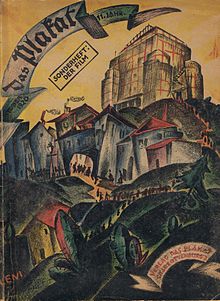
Quick Facts
Biography
Paul Leni (8 July 1885 – 2 September 1929), born Paul Josef Levi, was a German filmmaker and a key figure in German Expressionist filmmaking, making Backstairs (Hintertreppe, 1921) and Waxworks (1924) in Germany, and The Cat and the Canary (1927), The Chinese Parrot (1927), The Man Who Laughs (1928), and The Last Warning (1929) in the U.S.
Life and career

Leni was born to a Jewish family in Stuttgart. He became an avant-garde painter at the age of 15, he studied at Berlin's Academy of Fine Arts, and subsequently worked as a theatrical set designer, working for a number of theatres in Berlin (but not with Max Reinhardt).
In 1913 he started working in the German film industry designing film sets and/or costumes for directors such as Joe May, Ernst Lubitsch, Richard Oswald, and E. A. Dupont.
During World War I, Leni started directing as well with films such as Der Feldarzt (Das Tagebuch des Dr. Hart, 1917), Patience (1920), Die Verschwörung zu Genua (1920/21) and Backstairs (1921). Waxworks (1924) was planned as a four-part omnibus feature, but the last part was not shot when money ran out. He also made a series of unusual short animated films Rebus-Film Nr. 1 - 8, which were filmed crossword puzzles.
Leni designed short prologues for festive film premieres in Berlin cinemas, such as Lubitsch's Forbidden Paradise (1924), Herbert Brenon's Peter Pan (1924), and E. A. Dupont's Variety (1925).
In 1927, he accepted Carl Laemmle's invitation to become a director at Universal Studios and moved to Hollywood. There Leni made a distinguished directorial debut with The Cat and the Canary (1927), an adaptation of John Willard's stage play. The film had a great influence over Universal's later classic "haunted house" horror series, and was subsequently remade several times, notably in 1939 with Bob Hope. The following year he directed the big budget The Man Who Laughs (based on the novel by Victor Hugo), one of the most visually stylized of late period silent films.
His final film was The Last Warning, envisioned as a companion film for The Cat and the Canary due to its predecessor's popularity. Leni died in Los Angeles on 2 September 1929, of sepsis brought on by an untreated tooth infection,only eight months after its release.He was 44.
Filmography
German films
As art director
- 1913 Ein Ausgestoßener (dir: Joe May)
- 1914 Das Panzergewölbe (dir: Joe May)
- 1915 Der Katzensteg (dir: Max Mack)
- 1917 Der Blusenkönig (dir: Ernst Lubitsch)
- 1918/19 Veritas vincit (dir: Joe May)
- 1919 Intoxication (dir: Ernst Lubitsch)
- 1920 The White Peacock (dir: E. A. Dupont)
- 1921 The Vulture Wally (dir: E. A. Dupont)
- 1921 Lady Hamilton (dir: Richard Oswald)
- 1921/22 Frauenopfer (dir: Karl Grune)
- 1922/23 Tragödie der Liebe (4 parts, dir: Joe May)
- 1924/25 The Farmer from Texas (dir: Joe May)
- 1925 The Wife of Forty Years (dir: Richard Oswald)
- 1925 Dancing Mad (dir: Alexander Korda)
- 1925/26 Manon Lescaut (dir: Arthur Robison)
- 1925/26 Einspänner Nr. 13 / Fiaker Nr. 13 (dir: Michael Kertész)
- 1926 The Golden Butterfly (dir: Michael Kertész)
- 1926 Maytime (dir: Willi Wolff)
As director (and art director)
- 1917 Dr. Hart's Diary/ Der Feldarzt / Das Tagebuch des Dr. Hart
- 1917 Prima vera
- 1917 Dornröschen
- 1918 The Mystery of Bangalore
- 1918 Die platonische Ehe
- 1919 Prinz Kuckuck
- 1920 Patience. Die Karten des Todes
- 1920/21 The Conspiracy in Genoa
- 1921 Hintertreppe (dir with Leopold Jessner)
- 1924 Waxworks (Das Wachsfigurenkabinett)
- 1925/26 Rebus-Film Nr. 1-8 (series of short films)
Universal Studio films
- The Cat and the Canary (1927)
- The Chinese Parrot (1927)
- The Man Who Laughs (1928)
- The Last Warning (1929)
